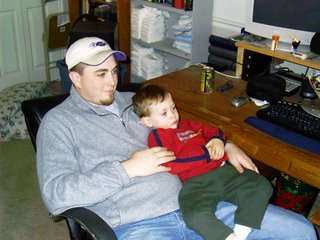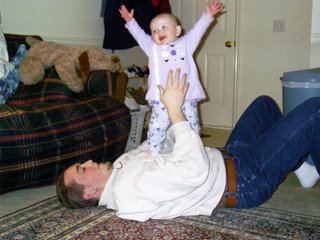I'm very happy for Stan and Eric, because until now all of my tales of adventures in daddying have been to them hearsay. Now they get to make some of their own stories.
 My own son, Harrison, is now four years old. I won't bother to claim that my style of daddying is the best around, or even better than any particular person's style. But I will say that Harrison is a better boy than I was, and I believe that this is due both to his given nature at and before birth, and to the parenting he's received since.
My own son, Harrison, is now four years old. I won't bother to claim that my style of daddying is the best around, or even better than any particular person's style. But I will say that Harrison is a better boy than I was, and I believe that this is due both to his given nature at and before birth, and to the parenting he's received since.Here I'll humbly offer some of my ideas regarding parenting. These are ideas and techniques that work for me, and nothing more. I think I'm right about a lot of this stuff, but you may not, and that's ok.
The first, and most important concept that Crystal and I have used is that we have discussed our childrens' actions and planned out what will happen when something is wrong. It's hard to be perfect with this, but if Harrison does something I don't like, I tell him it's wrong, and what the consequence will be the next time he does it. For the most part, he knows what will happen when he hits his sister, or when he speaks rudely to his mom, or when he refuses to go to time out. A lot of this won't mean much until your boys are 12-18 months old, though.
Harrison slept incredibly well for the first three months of his life. Most of the time, he let us sleep unless he was hungry. Once his tummy was full, he went back to bed and so did we. After the three months though, he would frequently wake up at night and want to play.
Crystal and I talked about this together, and decided that if we gave in to him at night and played with him or let him come to our bed, then he would get the idea that playing with mommy and daddy at night is ok.
And so for months, when Harrison would cry at night, we would go to his room and offer him a bottle. If he refused it we would leave. He would then cry until he fell back asleep because we wouldn't go in and play with him.
Sitting still and listening to her baby cry is one of the most agonizing things that a mother can bear. This is doubly true if she is still nursing, and the baby's cry makes her milk drop even though the kid isn't ready to eat.
Crystal was very courageous during this period, and by the time he was nine or ten months old, Harrison understood that bed time was bed time, and he could sleep, or babble to himself, or play with a stuffed bear in his crib, or look around, or cry...but crying wouldn't do anything for him. Sure, it would get us to look in and make sure everything was ok, but he'd still be in the crib. By the end of that first year, he only cried if he was hungry, because we'd taught him that crying means mom and dad think you need a bottle.
So I guess my dominant theme would be consistency. Ivan Pavlov and his wondrous dogs are often seen as examples of action/result behaviors and Maslow is handy when evaluating motivators and their effect on a being, but the sad truth is that your kid will not learn causality or modified behavior through skillful use of motivators as readily as a Golden Retriever will.
 Kids are humans, and humans are incredibly complex, thinking animals. One of the notorious shortcomings (or glories) of the human condition is the ability to possess a stubborn will to do an action and expect the wrong consequence over and over again. And kids aren't even that simple, because they're not completed humans, they're developing humans. So whatever sensibilities they'll possess later probably won't apply just yet. Or the influence of these sensibilities may be spotty.
Kids are humans, and humans are incredibly complex, thinking animals. One of the notorious shortcomings (or glories) of the human condition is the ability to possess a stubborn will to do an action and expect the wrong consequence over and over again. And kids aren't even that simple, because they're not completed humans, they're developing humans. So whatever sensibilities they'll possess later probably won't apply just yet. Or the influence of these sensibilities may be spotty.Your task then, new parent, is to be more patient and consistent than Pavlov ever was. Yes, classical conditioning works on kids, but at the cost of sweat and tears at a minimum, if not blood.
Volumes have been written about this stuff, but I'm not an expert, and in the end all I'm shooting for here is a congratulatory post with some few tips that might help, or could be (very justifiably) ignored.
And so, just a few small anecdotes:
I spank. I think that daddies who spank justly (and sparingly) are right, and I think that daddies who decide not to spank at all are also right. This is the serious side of spanking.
I've elevated spanking to a mythical physiological mandate, dubbing it "PRT", or Posterior Realignment Technique. I've also theorized that pockets of a certain enzyme form in the gluteus, and that this enzyme is only released into the bloodstream through spanking. When the child's brain is deprived of this enzyme, it rots. When a child behaves as if he or she is in possession of a damaged brain, PRT may be necessary in order to preserve what's left of the brain. This is the non-serious, mythological side of spanking.
When my kids come out of time out, or have been spanked, we always take a moment to talk about what went wrong, and they always get a hug from daddy. I also tell them periodically that time out and spanking are some of daddy's jobs. He doesn't like doing them, but he has to. (Of course, mommy also disciplines the kids and hugs them, but this isn't about her.)
I hug my kids and talk to them often. I keep busy with work, but I try to make sure that I've had a conversation with both of my kids every day, and I make sure to hug and kiss them every day as well.
I make a point of apologizing to my kids when I've done something wrong. We frequently talk about how daddies and mommies make mistakes, too. A couple of times, I've misunderstood the situation and wrongly spanked them. Spanking is a severe punishment to them, so I treat these mistakes and their feelings very seriously, and we talk about it until they feel better.
When I talk to them, I try to kneel or sit down so that we're eye to eye. It would be hard for me to understand or relate to someone twelve feet tall.
A while back I made a mistake in my business, and I came home feeling terrible. The kids had just been put to bed, so I went in and hugged Rachel for a while to feel better. She was mystified to see me cry, so I explained to her that "Sometimes daddies cry, too." She still likes to repeat to me that "Sometimes daddies cry."
Finally, I like to check on my kids as the last thing I do before I go to bed. I shift them so they won't fall out of bed, and I cover them up if they're cold, and sometimes I whisper into their sleeping ears, "I love you." Very rarely, they whisper back, "I love you too, daddy." Then daddy cries a little and goes to bed.
